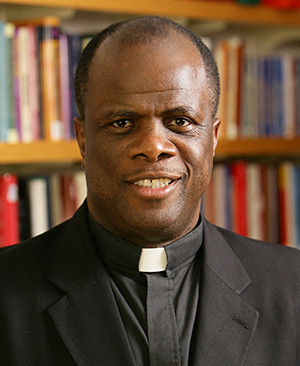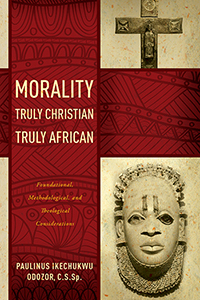 Rev. Paulinus Ikechukwu Odozor, C.S.Sp.
Rev. Paulinus Ikechukwu Odozor, C.S.Sp.
The Catholic Church in Africa is growing at an annual rate of over 3 percent. With that growth has come an increase in those called to religious life and the priesthood. Today, the largest seminaries in the Christian world are in Africa, and many African churches have become missionary churches as well—with missionaries all over the world.
Given the largely Eurocentric nature of moral theology in the history of the Roman Catholic Church, what will it take to invest the theological community in the history and moral challenges of the Church in other parts of the world, especially Africa? What is to be gained for the whole Church when this happens in a deep and lasting way?
These are some of the questions Rev. Paulinus Ikechukwu Odozor, C.S.Sp., associate professor of moral theology, the theology of world church, and Africana studies at the University of Notre Dame, explores in his latest work, Morality Truly Christian, Truly African: Foundational, Methodological, and Theological Considerations.
“This is an ambitious book, a big book,” said M. Shawn Copeland, professor of theology at Boston College. “The scholarship is sound and the author engages a range of authors and their views. Odozor takes seriously the critical and moral demands of Christian theology as well as those of African indigenous religions and their cultures. There is perhaps nothing so thoroughgoing on this topic since Bénézet Bujo’s Foundations of an African Ethic: Beyond the Universal Claims of Western Morality.”

Following a brief history of the development of African Christian theology, Odozor examines responses of African theologians to African tradition and Christian responses to the reality of non-Christian religions. In a context where the African religious experience and heritage are powerful sources of meaning and identity, Christian evangelization raises questions both about the African primal religions and about Christianity itself and its claims.
Odozor takes up the subject of moral reasoning in African Christian theological ethics and concludes with case studies that show how the African Church has tried to inculturate moral discourse on a religiously pluralistic continent and relate the healing gospel message to African situations.
“There are very few in theological ethics who can draw people into conversation through their combination of insightful argument and their gracious welcome to those in other academic fields,” said David Clairmont, the Tisch Family Associate Professor of Theology at Notre Dame. “In Morality Truly Christian, Truly African, Paulinus Odozor succeeds on both counts, speaking boldly but charitably across ecclesial, cultural, and academic divides.
“By articulating an ethical methodology drawn from the moral reasoning of the African Christian churches, taking seriously the challenges of cultural particularity but also moral realism, and also giving the reader a sense of the complex pursuit of the truth about God and the human in history, Odozor has dared (and delivered) what few would attempt but many need—a genuinely comparative theological ethics.”
Odozor’s research focuses on foundational issues in moral theology and Christian ethics; the history of moral theology; contextual theological issues, including questions pertaining to inculturation; theology and society; African Christian theology; and the theology of marriage. He is the author of Moral Theology in an Age of Renewal: A Study of the Catholic Tradition since Vatican II and Richard McCormick and the Renewal of Moral Theology, and editor of Sexuality, Marriage, and Family. His articles have appeared in journals in Africa, Asia, Europe, and North America.
Before coming to Notre Dame’s College of Arts and Letters in 1999, Odozor held academic and pastoral positions in Nigeria and Canada. He is currently president of the Governing Council of Spiritan International School of Theology in Enugu, Nigeria.
Originally published by at al.nd.edu on December 09, 2014.